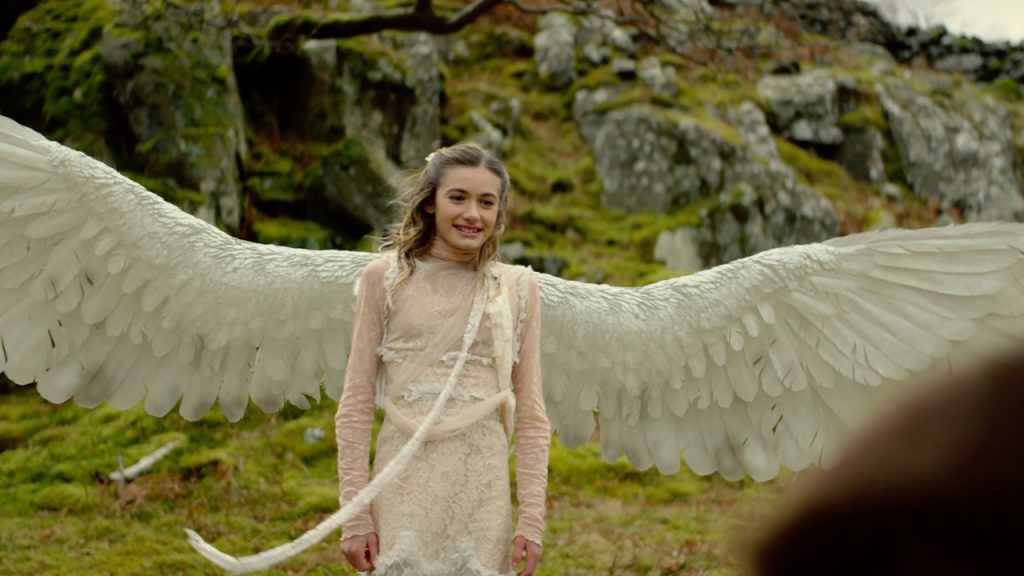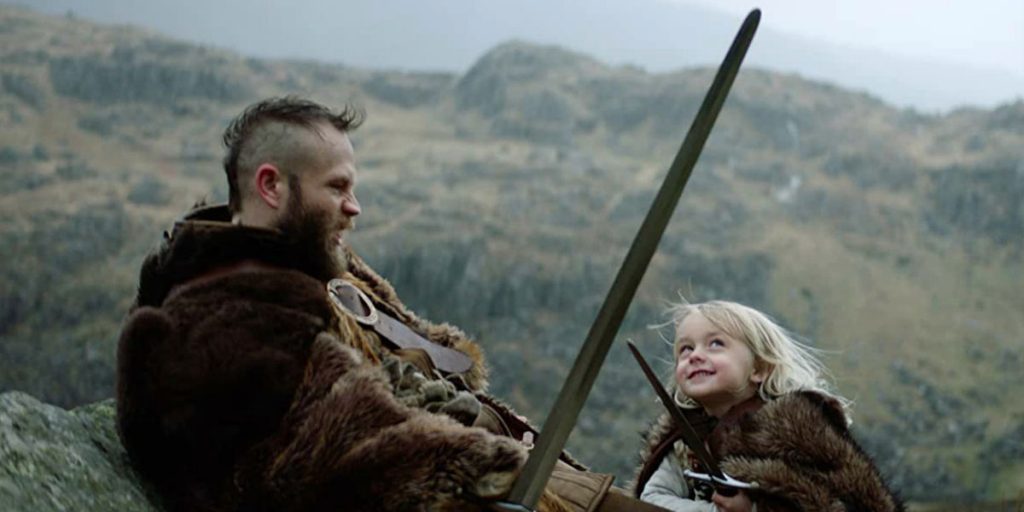The Place of No Words combines “reality cinema” with fantasy, in a heartfelt story about a family dealing with life’s impermanence.
“Where do we go when we die?
I don’t know, where do you think we go?
I don’t know.”
In Mark Webber’s The Place of No Words, a family facing terminal illness asks the ultimate question: Where do we go when die? Mark (played by Webber himself) is dying, and his three years old son, Bodhi (Bodhi Palmer), is struggling to grasp and come to terms with the inevitable end. Constructed with a deliberately disordered narrative, the film introduces us right away to our two main characters, both as the fictional version of who they are in “real life” and as their otherworldly Viking counterparts. In fact, a “dream world” has been conjured by Bodhi’s mind, in an attempt to deal with the unpleasant reality, and this takes us on a carousel of snapshots of real-life family moments (from birthday parties to hospital visits) and dream-like sequences where the two main protagonists take off on a journey to a distant land.
As the “real life” Mark and Bodhi navigate life’s uncertain waters, dealing with the finality of Mark’s illness, their Viking alter-egos embark on an epic journey, sailing on wild seas and hiking through mossy forests in search of Freeka Reeka Sheeka Deeka. If you are wondering about what that is, it’s because what this high-sounding name really means hasn’t actually been truly defined within the story. This is an intentional choice, as the director leaves it to the audience to decide who or what it is: Freeka Reeka Sheeka Deeka is something, or someone, whose meaning changes for our heroes – and us viewers – as they keep looking for it: my very first guess was that it might have been the name of a witch, personifying acceptance.
The Place of No Words stems out of Mark Webber (The End of Love, Flesh and Blood)’s obsession for authenticity and realism in films, and his desire to represent an authentic father/son relationship that felt true and real. The director teamed up with his long-time producing partner Dustin Hughes and Patrice Lucien, and delved once again into the experimental territory of what he calls “Reality Cinema”, a style of storytelling in which real life and cinematic fiction overlap and cross boundaries: this time, he adds fantasy elements to the mix. As we look at the story through Bodhi’s eyes and imagination, we keep stepping in and out of his “make-believe” world, encountering mythical characters – such as Esmeralda (Nicole Elizabeth Berger, of Clover), an ethereal guardian angel and a delicate and comforting presence in the story – and real life figures, as Bodhi and his close family attempt to deal with his father’s terminal illness, until the two finally overlap.

Mainly focusing on father and son interaction, the story pushes all the other characters, including Bodhi’s real and cinematic mum Teresa Palmer, to the background, and, although we are left wanting more of Palmer’s luminous presence on screen, her performance is nevertheless able to add layers of authenticity and tenderness. The rest of the cast includes Phoebe Tonkin (The Originals), appearing in a small cameo as herself, Sarah Olsen-Wright (American Made, Spinning Out) and husband Eric Christian Olsen (Dumb and Dumber), playing both themselves and their Knights in shining armour alter-egos within Bodhi’s imaginary world.
The Place of No Words breathes the intimate feel of a “homemade” movie, as we watch Mark and his family in the real world, but its photography and pace echo Terrence Malick’s The Tree Of Life. The film’s script and direction also remind us of Malick, as well as 80s adventure movies like The Never-Ending Story and Where the Wild Things Are, but Webber is also getting closer to defining and refining his own style, which slightly differs from previous features of his that have a coarser texture. Although the whole movie is melancholy-glazed, a few light-hearted scenes bring us a genuinely much-needed smile: these scenes include glimpses of the happy family at home, Bodhi’s accidental humour and goofiness, and (literally) saccharine-coated scenes displaying the Vikings eating candies and fizzling wild berries, stepping into farting swamps in the forest – playing (sometimes a little too much) on the “kids’ cuteness” card to lift our otherwise too saddened spirits.
Wales’s grey skies and lush scenery prove to be the most perfect and magical setting for the Viking’s whimsical scenes, gifting the audience with truly breath-taking footage, whilst skilfully mastered lighting and photography capture the gentleness and intimacy of the family moments. Although the film feels slow at times, it ultimately manages to pick its tempo back up, without losing its audience thanks to its excellent video and sound editing. The film’s sound is absolutely one of the finest points of its production, and Paul Kelly’s “I Am Not Afraid of The Dark Anymore” playing at the end of the movie is a superb choice, its melody and lyrics fitting flawlessly as the credits are about to roll.
The Place of No Words is a bittersweet, poignant love letter from Webber to his children, threaded with zen quotes (“I fight with myself all the time, I am my biggest enemy, says the injured knight”) and beautiful lyrical rhymes. This modern fable tells us to look at life with wonder and openness, encouraging us to experience it as a magical – and, at times, frightening – adventure, demanding us to be brave, but equally rewarding us with love, freedom and joy. Ultimately, the film is not just about death and the struggles around it: it is an elegy to life and its journey, a hymn to love to remind us that our legacy, the memories and the love we share and bestow to the people we love are the most precious.
The Place of No Words opened in US Theaters and VOD on October 23, 2020.

